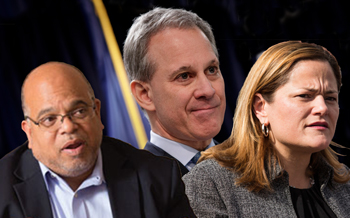As state and city officials ramp up efforts against unscrupulous landlords, the Real Estate Board of New York is firing back against a bill that seeks to make it easier for tenants to file harassment claims against their landlords.
The City Council is considering a package of bills to crack down on property owners who harass their tenants. One of measures seeks to create a rebuttal presumption that if a landlord commits one of a list of “harassing act[s] or omissions,” the tenant has a harassment case.
The current law requires tenants to show that their landlord acted in an effort to force them out of their apartment. The proposed bill would lower the threshold of harassment to include acts that “substantially interfere with or disturbs the comfort, repose, peace or quiet” of a tenant.
REBNY claims the bill tilts too far in favor of tenants. The bill also, according to REBNY, unfairly shifts the burden of proving the harassment didn’t occur on the landlord.
“Tenant harassment is wrong and so is denying the basic American principle of ‘innocent until proven guilty,’” REBNY President John Banks said in a statement.
“The Council’s bill to create a rebuttable presumption of harassment upon the landlord will only encourage tenants to file flimsy claims of harassment, create backlogs in an already-strained court system and delay rulings on legitimate cases of harassment.”
For a hearing before the Committee on Housing and Building on Wednesday, REBNY prepared testimony opposing this and other bills.
“A cottage industry of tenant-side lawyers could base entire practices with harassment cases as their staple,” the organization wrote in prepared remarks. “In no way should REBNY’s opposition be construed as minimizing legitimate cases of tenant harassment but this bill would turn the most basic American concept of justice – ‘innocent until proven guilty’ – on its head.”
Council member Helen Rosenthal, one of the bill’s sponsors, said that landlords often needlessly drag their tenants to court, claiming failure to pay rent when they never cashed tenants’ checks. She doesn’t foresee the proposed bill causing a flood of tenants to file claims against their landlords.
During her state of the city address, City Council Speaker Melissa Mark-Viverito said that it was necessary to shift the burden of proof onto the landlord.
“Tenant harassment is all too rampant. But because it can be hard to prove in court, most harassment goes unchecked,” she said. “And even when a tenant does beat the odds and win, they typically get nothing.”
Last week, New York State Attorney General Eric Schneiderman proposed legislation that would further criminalize tenant harassment. As the law stands, landlords can only be charged if the tenant is injured and prosecutors can show that the landlord intended to cause harm. Under the proposed law, landlords could face a misdemeanor to felony charges for a range of harassment.
Another City Council bill seeks to create a task force that will oversee issues that arise during renovations in residential buildings. The idea is to help combat harassment through construction.
